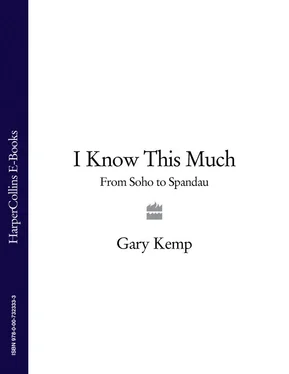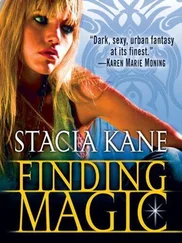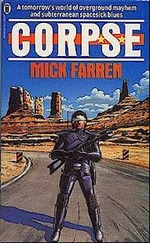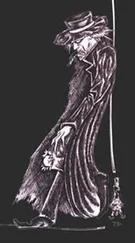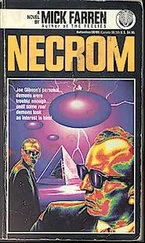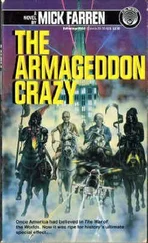Ian Mill fills the room. Not just physically—he has a large, well-stocked frame, a picture of his own success—but also in terms of his character—a Pickwickian presence born of public-school confidence and class. ‘Spy’ should have drawn him for a Victorian issue of Vanity Fair . He picks up a handful of folders from his aching desk, buries them into his obediently open briefcase and, with a swipe of his hand, clears his barrister’s wig from the table, places it on the top of the folders and closes his case with a snap.
‘Gentlemen?’
I wonder if he’d put the tonal question mark after ‘Gentlemen’ for other, more suspicious reasons. Here, in the theatre of law, stands the last bastion of the class system. Accents are prepared and nurtured, polished and loaded, before being sent out to pronounce judgement upon the fools of the world. I gaze through the window on to the redbricked Inns of Court, survivors of the Great Fire of London and the Blitz, serving as historic reminders of the eternity of order. I find a certain comfort in all of this, and a genetically encoded forelock is being pulled as Steve Dagger and I follow Ian and our team out of the chambers and into the cold bright day that lights the Inns with a nostalgic beauty. As we walk towards the court I feel myself locked into a crashing inevitability and envy the otherness of passing people, on their way to meetings, coffee, loved ones. But Ian bestrides the Strand and it’s all I can do to keep up. We are about to enter his arena.
The Gothic, grey-stone edifice that is the Royal Courts of Justice could be the grand entrance to Oz, overdressed with multiple arches and varied ornate carvings, with a dark spire that points its righteous finger to heaven. But people don’t come here to ask for a heart or courage, just judgement, and, of course, some money. Outside, a pack of media jostle for a statement and some pictures, and I submit myself to the hungry lenses, suddenly relieved that I hadn’t gone for the pink.
We pass through security, and make our way to Court 59. I dread my first meeting with the others. Will it all seem ridiculous when it happens? Will they drop the whole thing on seeing me and realise how preposterous it all is? We arrive at a tiny anteroom and Ian vanishes, leaving Dagger and me, and my two young lawyers, feeling temporarily rudderless. He returns dressed for his performance: wig pressed snugly over his boyish blond waves; white barrister bands tight around his pink neck, and a flowing, long black gown. I feel sick again and wish I’d never read Bleak House .
He resettles his wig; it seems to be focusing his mind. ‘Try to sit at the front. Good to be seen clearly by the judge.’
Our Queen’s Counsel, Barbara Dohmann, arrives—a small, middleaged German woman whom I’m glad to hear is referred to in the business as ‘Doberman’—and we shuffle into the aesthetically neutered courtroom. I’m relieved to see that the others aren’t here yet and, following Ian’s thrusting finger, we slide on to the front bench. Dagger squashes up to my right. This is the man who’d helped to create Spandau Ballet; who has lived, breathed and dreamt it as much any one of us. The rejection he has suffered would have been just as painful, the accusations worse.
He prods me, and with a nod points out their barrister, our adversary, Andrew Sutcliffe. Sharp and feral, his thin nose hovers importantly over his opening statement and I wonder how much pleasure he anticipates from my destruction. Beyond him, in the public seats, I notice some familiar faces—long-term followers of the band: fans. They look excited as they settle into their spaces and arrange their bags between their legs. Next to them are members of the press, notebooks and pens appearing from mucky pockets, and I can feel them begin to scrutinise me and I wonder how you look when you’re about to be sued out of your home.
The courtroom door opens; a sudden hush of voices from outside, and, turning, I catch my first sight of what they call the plaintiffs, the men who’ve brought me here, the same men that I’d known as boys, that I’d embraced a thousand times, that I’d lived a young man’s dream with: John Keeble, Steve Norman, Tony Hadley—men who had been my friends. I want to say hello—it feels ridiculous not to, we’ve known each other since school—but they avoid my gaze as they sideways-step into the bench at the back of the room. I’m surprised by John’s rock-‘n’roll-flavoured peroxide hair, a recent statement of his commitment to the cause. I was probably closer to him than to any other throughout the whole extraordinary ride. I manage to catch his eye but he rejects it and sits between Steve and Tony. The press start to scribble. They can sense fear. To them, we must have the distressed look of people who’ve swum too far out to sea.
The fifth member of the band is missing—my brother. Only recently recovered from two brain operations to remove benign tumours, he is now—thankfully—forging a career as a successful TV star and has rightly chosen to avoid the court. But I have with me, in my heart, his blessing.
Two young clerks with over-gelled hair and oversized tie-knots arrive with trolleys teetering with box-files. Wheeling them to the front of the courtroom, they casually unload the fifteen or so numbered boxes across the long console table directly in front of me. I quickly understand what they contain. Within them lies my life: cuttings of articles interviews and photographs; letters and faxes; contracts—a yellowing, fading potpourri of our history to be judged by bewigged, gowned men from another world. All had come to this. Inside those dull boxes lay the innocent faces of five young working-class lads from London, living the greatest story they could have wished for, a story that is about to be told in the many different ways they remember it.
I suddenly realise how familiar this all is and feel sure now that it will drag itself through to the bitter end. This, after all, is another show. We’re finally back together again; and the music will be played, and hearts will race. Here, surrounded by a crew of helpers and advisers, with a stage to stand on and an audience to listen, Spandau Ballet is once more the headline act.
‘All stand for the judge.’
A stooped-looking clerk, the judge’s toadying roadie, makes the announcement from the dais and we noisily obey. The stenographer crooks her fingers over her keys as though she’s about to start a concerto, and Mr Justice Park, middle aged, thin and grey, but with gown flowing dramatically behind him, enters stage left and takes his central seat.
As I watch this powdered pomp begin, it occurs to me that the court is pure theatre. With its cast of goodies and baddies, it is improvised, emotional, and although without a predetermined denouement, as sure as in any good Greek tragedy there’ll be a grand judgement from above, a winner and a loser, and before then, an awful lot of dressing up.
It began with an unwanted Christmas present. The year previously I’d been given a lunar landing module—well, a six-inch one, but I could hover it over a grey plastic moonscape with such grace and stability that my ten-year-old mind felt the primal thrill of power rushing through it. You controlled the landing by aiming a fan-gun at the module’s attached balloon while issuing orders in a croaky American accent with lots of ‘beeps’ thrown in between the commands. What the ‘beeps’ in space-talk were for I was never quite sure, but they had something to do with adventure, bravery and the future that we now lived in. American accents were a must if any boy were to cut the mustard in an Islington playground and have any level of cultural credibility among his peers. Whatever the asphalt fantasy, it usually demanded you being an American, be it a Thunderbird, a superhero, or one of the Rat Patrol. I even did James Bond in American.
Читать дальше
